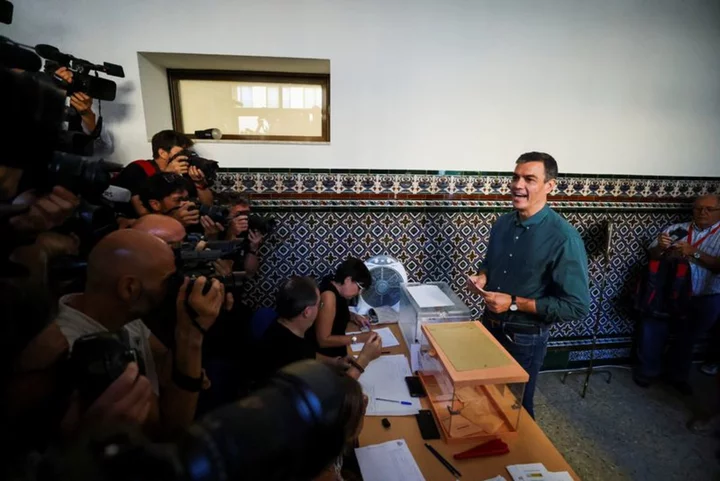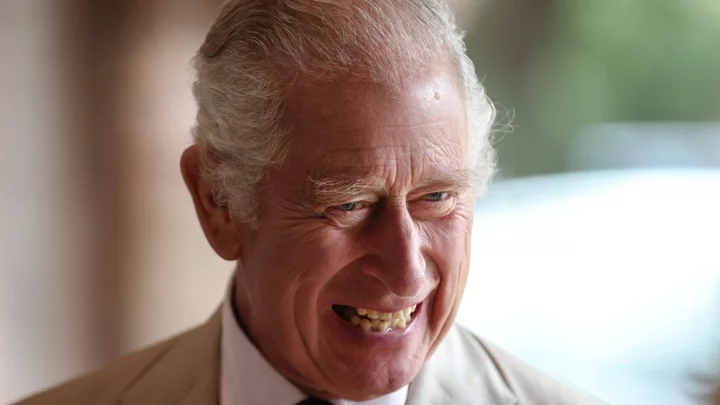By Horaci Garcia and Guillermo Martinez
MADRID (Reuters) -Spaniards began voting on Sunday in a potentially close-run general election that could see Prime Minister Pedro Sanchez's governing Socialists lose power and a far-right party make up part of a new government for the first time in 50 years.
Sanchez called the election early after the left took a drubbing in local elections in May, but his gamble to wrong-foot his opponents could backfire.
Opinion polls show the election will likely produce a win for Alberto Nunez Feijoo's centre-right People's Party, but to form a government it will need to partner with Santiago Abascal's far-right Vox. This would be the first time a far-right party entered government since Francisco Franco's dictatorship ended in the 1970s.
Voting opened at 9 a.m. (0700 GMT) and will close at 8 p.m. (1800 GMT) (9 p.m. in the Canary Islands) when voter surveys conducted via phone calls over the past week will be released.
The final result is expected to be decided by fewer than a million votes and fewer than 10 seats in the 350-seat parliament, experts say.
A small group of people shouted "liar" and a similar-sized group shouted "prime minister" at Sanchez as he went to a polling station to vote, TVE footage showed. He told reporters he had "good feelings" about the election outcome.
Many Spaniards are furious at being called out to vote at the height of the sweltering summer when they are on vacation.
Postal workers arrived at polling stations with boxes of postal votes on Sunday. The postal service reported on Saturday that postal votes had set an all-time record of 2.47 million, as many people choose to cast their ballot from the beach or mountains.
The government said 100% of polling stations were functioning normally 90 minutes after polls opened.
"The status quo scenario and a hung parliament are still a real possibility, likely with 50% combined odds in our view," Barclays wrote in a recent note to clients, citing the thin margin in PP's favour and overall uncertainty regarding polling and voter turnout.
The outcome could hinge on whether Feijoo or Sanchez command the support of enough smaller parties to form a coalition government.
The prime minister's minority Socialist (PSOE) government is currently in coalition with far-left Unidas Podemos that is running in Sunday's election under the Sumar platform.
A SWING TO THE RIGHT?
Sanchez's government has passed progressive laws on euthanasia, transgender rights, abortion and animal rights and has told voters such rights could be stripped back if the anti-feminist, family values-focused Vox is part of the next government.
With the major parties reliant on smaller parties for support, the political centre has been dented.
In Barcelona, engineer Luis Alonso, 43, said "globally the world is heading to being more divided between right and left-wing... here is no different".
Sanchez, in office since 2018, has seen his term as prime minister marked by crisis management - from the COVID pandemic and its economic effects to the politically disruptive consequences of the failed 2017 independence bid in Catalonia.
PP leader Feijoo, who has never lost an election in his native Galicia, has played on his reputation for dullness, selling himself as a safe pair of hands, which could appeal to some voters, experts say.
An eventual PP government could water down the previous government's green agenda and take a far more conservative stance on social issues.
On the economic front, the PP has promised to streamline the tax system, cut taxes for lower-income earners, scrap a recently created wealth tax, boost industry and reduce value-added tax on meat and fish.
The formation of a new government depends on complex negotiations that could take weeks or months and may even end in fresh elections.
Such uncertainty could dent Madrid's effectiveness as the current host of the six-month rotating presidency of the European Union Council as well as its spending of EU COVID recovery funds.
(Reporting by Horaci Garcia, Guillermo Martinez and Catarina DemonyWriting by Jessica JonesEditing by Nick Macfie and Frances Kerry)









